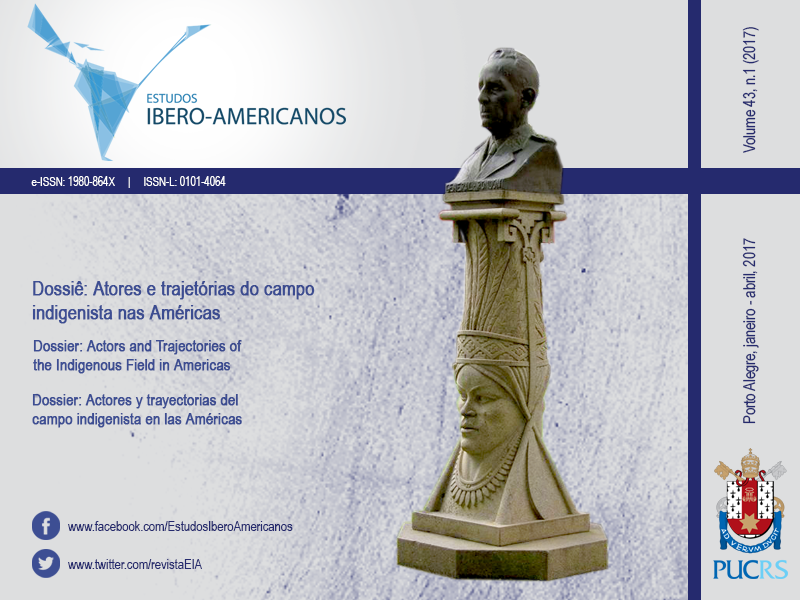Celebrating the Indian, defending the indigenismo: the “Indian Day” and the Inter-American Indian Institute
DOI:
https://doi.org/10.15448/1980-864X.2017.1.24069Keywords:
indigenismo, celebrations, Indigenous people, Indian Day, Inter-American Indian InstituteAbstract
The First Inter-American Indian Conference, held in Pátzcuaro (Mexico) in 1940, resolved to set aside April 19 of each year as “Indian Day” throughout the Americas to commemorate the date on which the Indian delegates joined the Conference. This article examines the creation of this new holiday by indigenistas who were at the same time founding the Inter-American Indian Institute (III) for the purpose of defining and developing a common policy about the “Indian problem”. I will first focus on the official adoption of Indian Day during the heyday of indigenismo (1940-1970), and discuss whether (or not) it became the hemispheric indigenista holiday envisioned by its creators. Secondly, the analysis of official speeches that the director and representatives of the III gave on occasion of the holiday will suggest that the Indian Day offered a useful scenario for an historical and present-day narrative about Indian People and Latin American countries, while assigning a crucial role to indigenismo. Actually, I will argue, the significance of the Indian Day, beyond its explicit tribute to the Indian, was rather related to the defense of indigenismo and the indigenista policies, at both the inter-American and the national level.
Downloads
References
ADAMS, Abigail E. El indigenismo guatemalteco: atrapado entre la promesa del interamericanismo y la guerra frías. En: GIRAUDO, Laura; MARTÍN-SÁNCHEZ, Juan (Ed.). La ambivalente historia del indigenismo: campo interamericano y trayectorias nacionales, 1940-1970. Lima: Instituto de Estudios Peruanos, 2011. p. 99-132.
BALLESTEROS GAIBROIS, Manuel; ULLOA SUÁREZ, Julia. Indigenismo Americano. Madrid: Ediciones Cultura Hispánica, 1961.
DAWSON, Alexander. Indian and Nation in Revolutionary Mexico. Tucson: The University of Arizona Press, 2004.
FREIRE, Carlos Augusto da Rocha. Indigenismo e antropologia. O Conselho Nacional de Proteção ao Índio na gesta Rondon (1938-1955). 1990. Dissertação (Mestrado) – Museu Nacional da Universidade Federal do Rio de Janeiro (UFRJ), Rio de Janeiro, 1990.
GIRAUDO, Laura. Un campo indigenista transnacional y “casi profesional”: la apertura en Pátzcuaro (1940) de un espacio por y para los indigenistas. En: GIRAUDO, Laura; MARTÍNSÁNCHEZ, Juan (Ed.). La ambivalente historia del indigenismo: campo interamericano y trayectorias nacionales, 1940-1970. Lima: Instituto de Estudios Peruanos, 2011. p. 21-98.
GIRAUDO, Laura. Neither “Scientific” nor “Colonialist”: The Ambiguous Course of Inter-American Indigenismo in the 1940s. Latin American Perspectives, v. 39, n. 5, p. 12-32, Sept. 2012. https://doi.org/10.1177/0094582X12447275
GUERRIER, Elizabeth. Applying Anthropology in the Interest of the State: John Collier, the Indian Office, and the Bureau of Sociological Research. History of Anthropology Annual, v. 3, n. 1, p. 199-221, 2007. https://doi.org/10.1353/haa.0.0024
LEWIS, Stephen E. ¿‘Problema indígena’ o ‘problema ladino’? Cincuenta años de pensamiento y políticas indigenistas en Chiapas. En: GIRAUDO; MARTÍN-SÁNCHEZ (Ed.). La ambivalente historia del indigenismo: campo interamericano y trayectorias nacionales,
-1970. Lima: Instituto de Estudios Peruanos, 2011. p. 251-291.
MARTÍN SÁNCHEZ, Juan. Indigenismo bifronte en el gobierno peruano de Velasco Alvarado: continuidad y alternativa, sierra y selva. En: GIRAUDO; MARTÍN-SÁNCHEZ (Ed.). La ambivalente historia del indigenismo: campo interamericano y trayectorias nacionales, 1940-1970. Lima: Instituto de Estudios Peruanos, 2011. p. 191-250.
PHILP, Kenneth R. John Collier’s Crusade for Indian Reform, 1920-1954. Tucson: University of Arizona Press, 1977.
RODRÍGUEZ, Miguel. Celebración de “la raza”: una historia comparativa del 12 de octubre. México: Universidad Iberoamericana, 2004.
SOUZA LIMA, Antonio Carlos de. Tradições de conhecimento na gestão colonial da desigualdade: reflexões a partir da administração indigenista no Brasil. En: BASTOS, Cristiana; ALMEIDA, Miguel Vale de; FELDMAN-BIANCO, Bela (Org.). Trânsitos coloniais: diálogos críticos luso-brasileiros. Lisboa: Imprensa de Ciências Sociais, 2002. p. 151-172.
SOUZA LIMA, Antonio Carlos de. El indigenismo en Brasil: migración y reapropiaciones de un saber administrativo. En: PACHECO DE OLIVEIRA, João (Comp.). Hacia una antropología del indigenismo: estudios críticos sobre los procesos de dominación y las perspectivas políticas actuales de los indígenas en Brasil. Rio de Janeiro/Lima: Contra Capa/Centro Amazónico de Antropología y Aplicación Práctica, 2006. p. 97-125.
TORMO SANZ, Leandro. Don Manuel Ballesteros Gaibrois y el indigenismo. Anthropos, v. 162, p. 38-41, 1994.
TROYAN, Brett. Re-imaging the “Indian” and the State: Indigenismo in Colombia, 1926-1947. Canadian Journal of Latin American and Carribean Studies, v. 33, n. 65, p. 81-106, 2008. https://doi.org/10.1080/08263663.2008.10816941
VERGARA, Jorge Iván; GUNDERMANN Hans. Chile y el Instituto Indigenista Interamericano, 1940-1993. Una visión de conjunto. Chungara, Revista de Antropología Chilena, Arica, v. 48, n. 1, p. 127-144, 2016.
Archivo Histórico del Instituto Indigenista Interamericano (AHIII), Ciudad de México.
Boletín Indigenista (BI), v. 1-21, agosto 1941-jun. 1961.
América Indígena (AI), v. 1-31, oct. 1941-jul. 1971.
Anuario Indigenista (AnI), v. 22-34, dic. 1962-dic.1974.
CONSELHO NACIONAL DE PROTEÇÃO AOS ÍNDIOS (CNPI). 19 de Abril. O dia do Índio. As comemorações realizadas em 1944 e 1945. Rio de Janeiro: Imprensa Nacional, 1946.
DIRECCIÓN GENERAL DE ASUNTOS INDÍGENAS. Legislación indigenista del Perú. Lima: Talleres Gráficos de la Penitenciaría Central, 1948.
INSTITUTO INDIGENISTA INTERAMERICANO. Acta Final del Primer Congreso Indigenista Interamericano. Patzcuaro, Mich. México. En: Primer Congreso Indigenista Interamericano. México: Instituto
Indigenista Interamericano, 1940. Vol. I, p. 1-42.
INSTITUTO INDIGENISTA NACIONAL. 19 de abril día del aborigen. Guatemala: José de Pineda Ibarra, 1970.
PÉREZ, Elizardo. Warisata. La escuela-ayllu. La Paz: Burillo, 1962.
RIBEIRO, Darcy. A politica indigenista brasileira. Rio de Janeiro: Ministério da Agricultura, 1962.
Downloads
Published
How to Cite
Issue
Section
License
Copyright (c) 2017 Laura Giraudo

This work is licensed under a Creative Commons Attribution 4.0 International License.
Copyright
The submission of originals to Estudos Ibero-Americanos implies the transfer by the authors of the right for publication. Authors retain copyright and grant the journal right of first publication. If the authors wish to include the same data into another publication, they must cite Estudos Ibero-Americanos as the site of original publication.
Creative Commons License
Except where otherwise specified, material published in this journal is licensed under a Creative Commons Attribution 4.0 International license, which allows unrestricted use, distribution and reproduction in any medium, provided the original publication is correctly cited.






